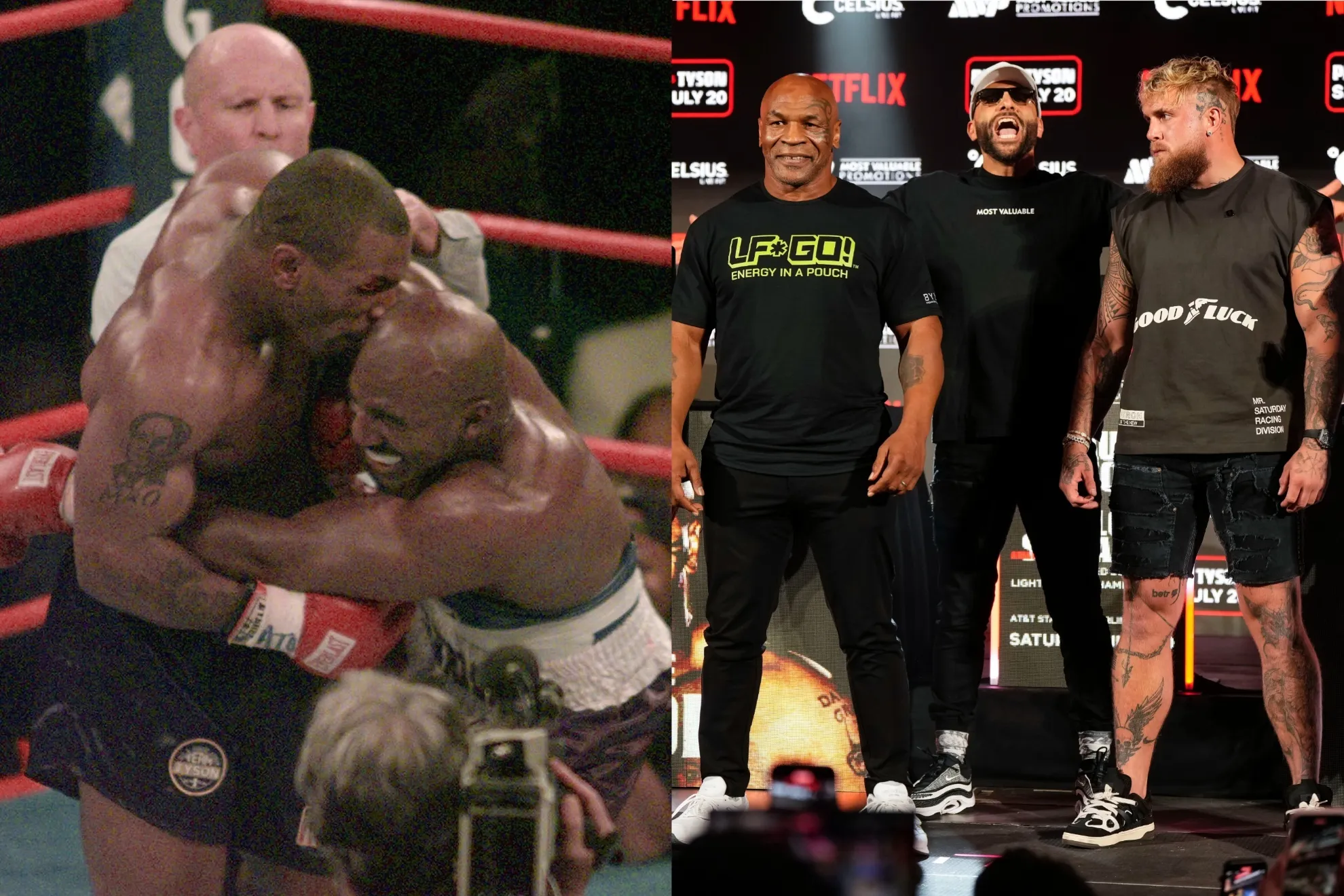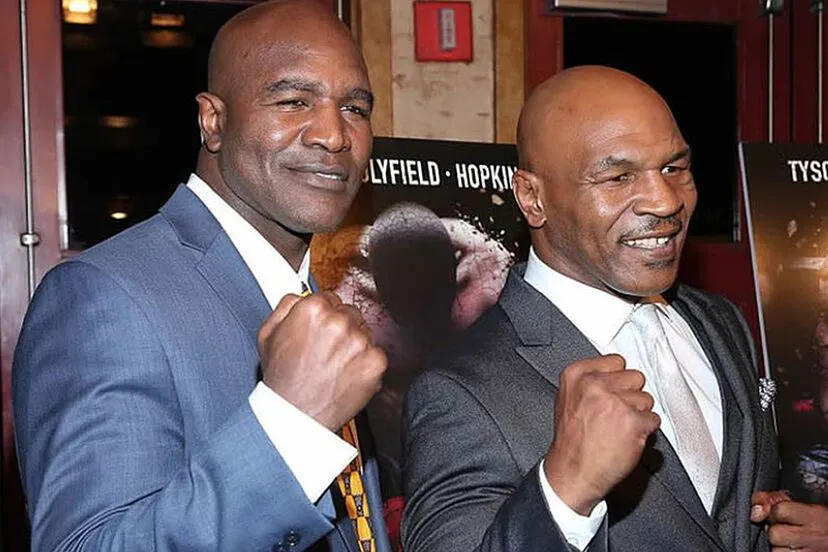“THERE’S A SCRIPT!” Evander Holyfield EXPOSES Jake Paul Is Hiding The Truth About Mike Tyson Fight
In a recent explosive revelation, boxing legend Evander Holyfield has made headlines by accusing popular social media personality and boxer Jake Paul of hiding crucial information about his rumored fight with Mike Tyson. According to Holyfield, the entire situation surrounding the potential match is not what it seems, with scripted elements playing a significant role. This shocking disclosure has stirred the boxing community and fans alike, raising questions about the authenticity of high-profile matchups in the modern era of sports entertainment.

The rumor mill has been abuzz with speculation about a potential fight between Jake Paul and Mike Tyson. The pairing, which seemed improbable at first glance, captured the imagination of boxing fans due to the stark contrast between the two fighters: Paul, a rising star in the boxing world known for his online fame, and Tyson, a former heavyweight champion with a legendary career.
The idea of such a match gained traction through social media and various promotional campaigns, leading many to believe that a fight was imminent. As the speculation grew, so did the excitement and anticipation among fans, who eagerly awaited official announcements and details.
Evander Holyfield, a former heavyweight champion himself, has recently come forward with a startling accusation. In a series of interviews and social media posts, Holyfield alleged that Jake Paul and his team have been orchestrating a script for the Tyson fight, claiming that the match is more of a theatrical production than a genuine sporting event.
Holyfield’s comments center around the notion that the fight’s outcome and narrative have been pre-determined, with scripted elements being used to generate hype and maximize profits. According to Holyfield, the entire scenario has been carefully crafted to create a spectacle rather than deliver an authentic boxing contest.

If Holyfield’s claims are accurate, the implications for the sport of boxing could be profound. The idea of scripted fights challenges the fundamental principles of competition and fairness that are supposed to underpin the sport. Boxing has long been a domain where skill, strategy, and physical prowess determine the outcome of a match. The introduction of scripted elements undermines the integrity of the sport and could erode public trust.
For fans, the revelation of a scripted fight would be a significant disappointment. Many view boxing as a genuine contest of skill and endurance, and the notion of pre-determined outcomes could diminish the excitement and credibility of the sport. The potential commercialization and manipulation of high-profile matches might also deter fans who value authenticity and fairness.
In response to Holyfield’s accusations, Jake Paul has firmly denied any wrongdoing. Paul has characterized the claims as baseless and reiterated his commitment to delivering real, competitive fights. According to Paul, any speculation about scripting or manipulation is unfounded and represents an attempt to undermine his achievements and career.
Paul’s team has also been vocal in defending the legitimacy of their promotional efforts. They argue that the excitement and interest generated by the Tyson fight are a testament to the match’s appeal and potential. The emphasis has been placed on the genuine competitive nature of the fight, with Paul asserting that he is prepared to face Tyson in a true test of skill.
The role of social media and promotional tactics in modern boxing cannot be understated. Platforms like Instagram, Twitter, and YouTube have become essential tools for building hype and engaging with fans. Fighters and promoters use these channels to generate buzz, create narratives, and drive interest in upcoming matches.

In the case of Jake Paul and Mike Tyson, the extensive promotion and buildup contributed significantly to the anticipation surrounding the fight. This approach, while effective in drawing attention, can also blur the lines between genuine competition and entertainment. The potential for scripted elements or theatrical aspects becomes more pronounced in an era where marketing and media play such a pivotal role.
The concept of scripted or pre-determined elements in sports is not entirely new. Professional wrestling, for example, has long been known for its choreographed matches and storylines. However, traditional boxing has been viewed as a sport where outcomes are determined by the fighters’ skills and efforts.
The blending of entertainment and sport in recent years has led to a more complex landscape. High-profile matchups and celebrity boxing events often involve elements of spectacle and promotion, raising questions about the balance between genuine competition and entertainment value. Holyfield’s accusations highlight the ongoing debate about where the line should be drawn.
As the boxing world grapples with these revelations, the future of the sport may hinge on its ability to maintain credibility and authenticity. The challenge for boxing organizations, promoters, and fighters is to navigate the evolving landscape of sports entertainment while preserving the core values that define the sport.
For fans, the authenticity of boxing remains a crucial factor in their engagement and support. Ensuring that matches are fair, competitive, and free from undue influence is essential for maintaining trust and enthusiasm within the boxing community. The scrutiny surrounding high-profile matches, such as the rumored Tyson-Paul fight, underscores the need for transparency and integrity in the sport.
News
JAW-DROPPING: The One Show Hosts SH0CKED as Tony Blackburn Drops 3-Word B0mbshell for I’m A Celeb Stars.K
The One Show hosts stunned as Tony Blackburn gives just three words of advice to I’m A Celeb stars The…
GMB host Kate Garraway share fears for co-star amid ‘threat to life’ weather warning as viewers furious: “How irresponsible!”.k
GMB host Kate Garraway share fears for co-star amid ‘threat to life’ weather warning as viewers furious ‘It could be…
FURIOUS: Stacey Solomon Breaks Silence on Sons’ New TV Gig Amid Explosive ‘Nepo Baby’ Backlash.k
Stacey Solomon sets record straight on sons’ new TV job amid ‘nepo baby’ backlash Behind-the-scenes snaps show the boys filming…
OUTRAGE: Deal or No Deal Contestant Slammed as ‘Greedy’ After Massive Win on ITV’s ‘Most Expensive Night’.k
Deal or No Deal contestant branded ‘greedy’ amid big-money win in ‘expensive night for ITV’ Last night’s Deal or No…
SH0CK REVEAL: Alison Hammond Anxiously Admits ‘Addiction’ Live on Air During ‘Therapy Session’ with Expert – Fans Stunned!k
This Morning host Alison Hammond concerned as she admits to ‘shopping addiction’ during live ‘therapy session’ ‘I’ve gotta stop it!’…
Meghan and Harry “hit back” amid claims her “behavior before wedding set alarm bells ringing”.k
Meghan Markle and Prince Harry ‘hit back’ over claims she ‘set alarm bells ringing’ ahead of their wedding The couple…
End of content
No more pages to load













Leave a Reply